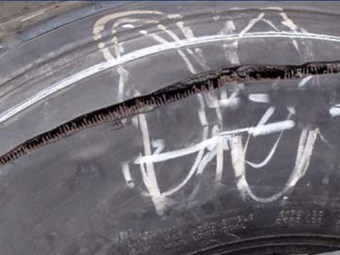Coroner Calls for Improved Tyre Pressure Monitoring

Potentially fatal: a zipper rupture in a tyre sidewall. Photo: US Rubber Manufacturers Association. Image source: fullyloaded.com.au
Pressure is mounting for the calls of a coroner, following a coronary inquiry into the death of a truck driver, to be implemented and heavy vehicle tyre pressure to be better monitored.
Following the coroner’s inquiry, there has been increased pressure for improved monitoring of tyre pressure and as an article on Fullyloaded.com.au points out, there are plenty of technologies to choose from to accomplish this.
A truck driver’s death at a mine site in Queensland has led to further interest in improved safety relating to tyre pressures and the changing of tyres and wheels.
The incident took place in 2010 when a road train driver was killed at the Foxleigh coal mine in the Bowen Basin.
The driver, 53-year-old Wayne MacDonald was killed while under a trailer. He had released the bottle jack when he was hit by a “percussive shockwave of air” due to the replacement tyre exploding due to the load after it made contact with the ground.
Queensland Coroner David O’Connell delivered his findings on the accident, following 2 other tyre blast deaths at Queensland Mines around that time.
[Tweet “Queensland Coroner calls for heavy vehicle tyre pressure to be better monitored following deaths”]
Mr O’Connell’s findings revealed that the tyre exploded due to a “zipper failure”. The tyre had been punctured previously and was repaired. It was marked “slow leak/OK” with a line crossed through “Slow Leak”.
An independent expert on the other hand, found no evidence that there was a problem with the tyre before it was chosen, pumped up in a cage and then fitted.
The writer of the post on Fullyloaded.com.au said that running under-inflated tyres can also cause the sidewall failure which leads to zipper ruptures. The post went on to state:
But the coroner said it wasn’t possible to know if the replacement tyre had previously run under-inflated for 100 metres or 100 kilometres, or not at all; and that zipper ruptures can happen without warning.
Source: http://www.fullyloaded.com.au
He also highlighted that 2 obvious signs of a potential zipper rupture were bulges and undulations.
Despite the coroner’s recommendations being specifically for the mining industry, the trucking industry as a whole can learn some lessons from them. These are particularly beneficial…
“That every tyre, whether new or repaired, undergo integrity testing by its inflation in a suitable tyre inflation cage, to a pressure of 120 per cent of the tyre’s recommended minimum cold operational inflation pressure, and then left for 20 minutes.”
“That any jack used by an operator has a handle of sufficient length to allow the operator to safely use the jack without the operator being in, or under, the truck or trailer, or within close proximity of the vehicle’s tyres whilst jacking occurs.
“That the industry investigate, and implement within two years, remote, or wireless, tyre pressure sensing equipment to allow operators to monitor tyre pressures from within the cabin of the truck.
“That until remote or wireless tyre pressure sensing equipment is introduced for these mine site tyres that the practice of tyre tapping (with a metal bar) should not be continued, and that accurate, calibrated, pressure gauges should be used to check correct tyre inflation…”
Source: http://www.fullyloaded.com.au
Operators and owners should keep in mind that chain of responsibility (COR) laws have been amended to include maintenance of heavy vehicles. Find out more about your COR duties here.


